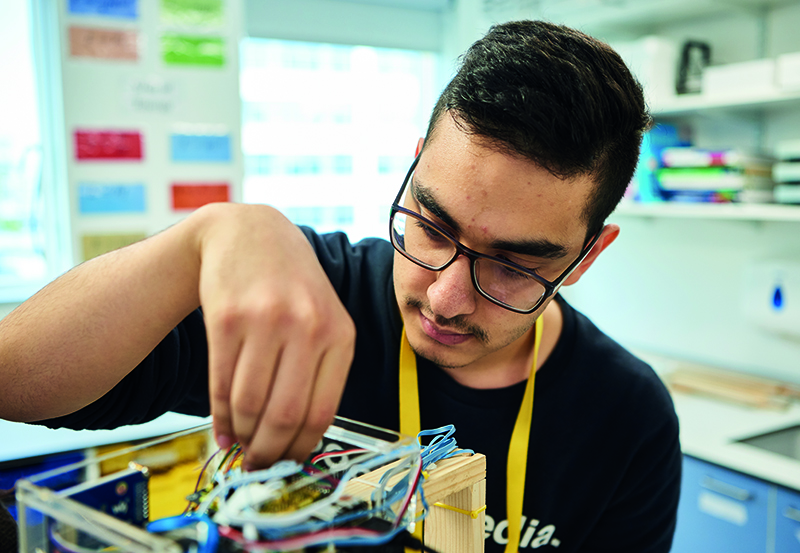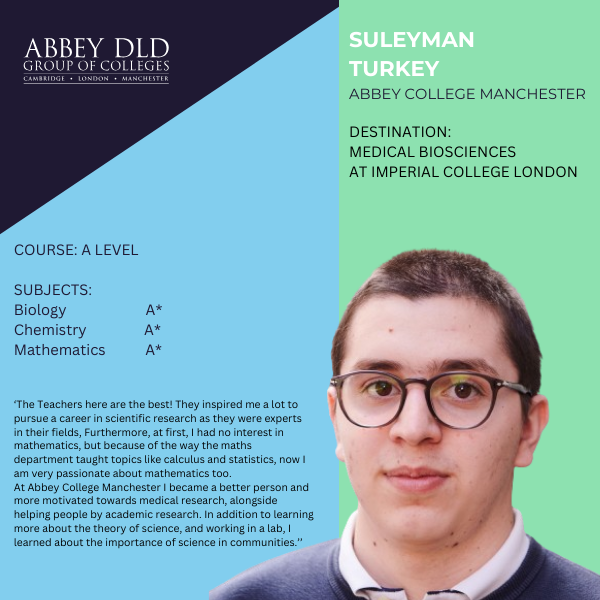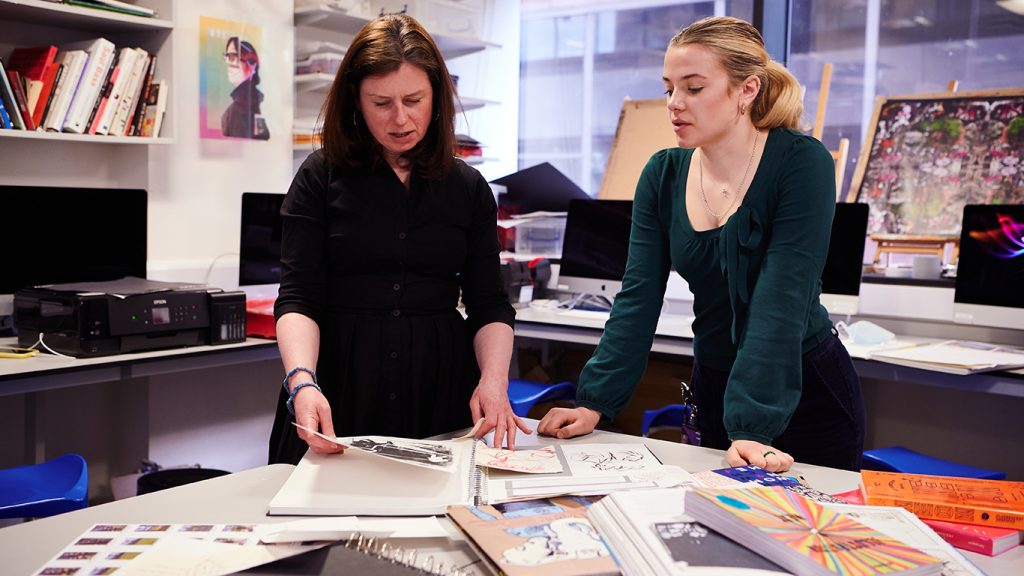Comparing the Differences Between the Turkish and UK Education Systems: A Guide for Turkish Students Thinking About Studying in the UK.
15th December 23

For Turkish students considering studying in the United Kingdom, understanding the differences between the Turkish and British education systems is crucial for making an informed decision. Both systems have their own unique structures, curricula, teaching methods, and assessment systems. This guide will provide a comprehensive comparison between the two education systems, helping Turkish students navigate the transition from the Turkish education system to the British one.
1. Structure
The Turkish and British education systems have distinct structures. In Turkey, the educational journey begins with İlköğretim Diploması (Basic Education Diploma), which is equivalent to education below GCSE in the UK. It is mandatory for students to complete this stage before progressing further.
In the UK, the education system is divided into key stages, with students starting at primary school and progressing through to secondary school. GCSEs (General Certificate of Secondary Education) are typically taken at the end of compulsory education, usually at the age of 16. GCSEs are roughly equivalent to İlköğretim Diploması in Turkey.
British vs Turkish Education System Comparison Chart
To provide a clear overview, the comparison table here highlights the key differences between the Turkish and British education systems:
| Education Stage | Age | British Education System | Turkish Education System | |
Pre-Primary | 3-4 | National Curriculum | School | National Curriculum |
4-5 | Early Years | Reception | Pre-Primary (Okul Oncesi) | |
Primary Education | 5-6 | 1 | Pre Primary covers up to the age of 6 and Primary starts at the age of 5 or 6. | |
2 | Primary (İlkokulu) – Leading to İlköğretim Diploması (Basic Education Diploma). | |||
6-7 | Key Stage 1 | 3 | ||
7-8 | 4 | |||
8-9 | 5 | |||
9-10 | ||||
Secondary Education | 10-11 | Key Stage 2 | 6 | Pre Primary covers up to the age of 6 and Primary starts at the age of 5 or 6. |
7 | Primary (İlkokulu) – Leading to İlköğretim Diploması (Basic Education Diploma). | |||
11-12 | Key Stage 3 | 8 | ||
13-14 | 9 | |||
14-15 | 10 | Upper Secondary (Lise) – 3 streams:
| ||
15-16 | Key Stage 4 (Leading to GCSE) | 11 | ||
16-17 | Level 3 qualification (Such as A Level or other equivalent i.e. BTEC) | 12 | ||
Higher Education-Bachelors Level | Bachelors (Honour Degree)/Bachelors Degree or Undergraduate | Lisans Diplomasi (min. 4 years) | ||
The Abbey DLD Group of Colleges (ADLD) consists of three independent sixth form colleges located in Cambridge, London, and Manchester, offering a wide range of academic study programmes.
At Abbey DLD we strive to achieve the highest academic standards whilst providing a welcoming, safe, high-quality learning and boarding experience for students from around the world. Our aim is to help our students achieve the academic success needed to progress to the UK and the world’s top universities, whilst also developing the personal skills and qualities to succeed at university and beyond.

2. Curriculum
The Turkish education system offers different curricula based on the chosen school type. General, vocational, and technical high schools have distinct programs that prepare students for specific career paths. In contrast, the UK follows a national curriculum at the secondary level, allowing students to choose their subjects at GCSE level, providing more flexibility in their education.
3. Teaching methods
Teaching methods in Turkey often adhere to more traditional approaches, such as lecture-style teaching. In the UK, teaching methods are diverse, encompassing group work, practical activities, and project-based learning, fostering critical thinking and problem-solving skills.
4. Assessment
In Turkey, students face annual centralised exams and continuous evaluations. In the UK, the main assessment for compulsory education is at GCSE, which students take at the age of 16. These exams determine eligibility for further education or employment. For university entry, students typically take A-Levels but a range of qualifications are accepted including BTEC and Foundation programmes for international students.
5. Languages
In the UK, English is the main language of instruction, and this remains consistent across all regions of the country.
In Turkey, Turkish is the primary language of instruction, and it is the language used in most educational institutions. However, there are also schools that offer education in other languages, such as Arabic, Kurdish, or English, depending on the institution’s focus and location.
At Abbey DLD Colleges, students who do not speak English as their first language will attend up to five hours of additional English lessons per week to help students to improve their understanding of lesson content and context, and to enable them to meet the English requirements of their first-choice university.
Overall, while both the Turkish and British education systems have their strengths and weaknesses, they have some fundamental differences in terms of structure, curriculum, and teaching methods.
Do You know?
Every year Abbey DLD Students achieve outstanding results and move on to join some of the world’s most prestigious and highly-ranked universities. In 2023, 41% of our A Level students and 38% of our Foundation students progressed to Russell Group Universities, and 14 of our students progressed to study at Oxbridge Colleges or Medical School.
Turkish Education System:
School Level:
İlköğretim Diploması (Basic Education Diploma):
- Comparable to Key Stage 2 SATs in the UK, taken in the final year of Primary education
- This stage provides a basic education foundation.
Lise Diplomasi (High School Diploma):
- Also known as Devlet Lise Diplomasi (State High School Diploma).
- Comparable to a level between GCSE and A-Level in the UK
- From 2013 onwards, grades of 50 to 100 are considered at least comparable to GCSE grades A*-C/9-4.
- English is studied as a second language and is not equivalent to English language GCSE in the UK
Meslek Lisesi Diplomasi (Vocational High School Diploma):
- Also known as Devlet Meslek Lisesi Diplomasi (State Vocational High School Diploma).
- Comparable to qualifications between BTEC First & BTEC National Qualifications in the UK.
- Grades of 50-100 are considered at least comparable to GCSE A*-C/9-4 if they correspond to a subject in the GCSE syllabus.
- English is studied as a second language and is not equivalent to English language GCSE in the UK.
Teknik Lisesi Diplomasi (Technical High School Diploma):
- Also known as Devlet Teknik Lisesi Diplomasi (State Technical High School Diploma).
- Comparable to qualifications between BTEC First & BTEC National Qualifications in the UK.
- Grades of 50-100 are considered at least comparable to GCSE A*-C/9-4 if they correspond to a subject in the GCSE syllabus.
- English is studied as a second language and is not equivalent to English language GCSE in the UK.

British Education System:
School Level:
GCSE (General Certificate of Secondary Education):
- Generally studied over the ages of 14-16.
- Equivalent to İlköğretim Diploması in Turkey.
- Provides a foundational education with qualifications in various subjects.
A-Level (Advanced Level)
- Generally studied over the ages of 16 to 18
- Allows students to specialise in 3 to 4 subjects
- Often required for university entry in the UK and also many others worldwide
- Examined at a higher level than the Lise Diplomasi – more equivalent to the Yükseköğretime Geçiş Sınavı (YGS) and Lise Diploması Notları (LYS).
BTEC First & BTEC National Qualifications:
- Equivalent to Meslek Lisesi Diplomasi (Vocational High School Diploma) and Teknik Lisesi Diplomasi (Technical High School Diploma) in Turkey.
- Offers practical and vocational education in various fields.
Additional Notes:
Turkish education places a significant emphasis on English as a second language, but this does not equate to the English language GCSE in the UK.
The Turkish system has specific grading criteria 50 to 100 that can be used to determine comparability to GCSE grades A*-C/9-4.
Both systems offer diverse pathways for students based on their interests and career goals, including vocational and academic tracks.
Turkish University-Level Education
Lisans Derecesi/ Lisans Diplomasi (Bachelors Degree):
- Comparable to Bachelor (Honours) Degree / Bachelor Degree when awarded up to and including 2005 in the UK.
- Final certificates may bear the title Lisans Derecesi or Lisans Diplomasi, both of which are translated into English as “Bachelors Degree.”
- Typically a 4-year undergraduate program.

British University-Level Education
Bachelor (Honours) Degree / Bachelor Degree:
- Typically a 3-year undergraduate programme in the UK.
- Comparable to Lisans Derecesi/Lisans Diplomasi in Turkey when awarded up to and including 2005.
- A wide range of disciplines is offered, including arts, sciences, and social sciences.
Additional Notes:
Turkish university-level education provides a diverse range of options, with the possibility of studying engineering, medicine, dentistry, or veterinary science, which are aligned with specific career paths.
The duration of medical, dentistry, and veterinary degrees is consistent with the UK, ensuring that graduates are well-prepared for their respective professions.
The comparability of titles in both systems allows for international recognition of qualifications, facilitating academic and professional mobility between Turkey and the UK.
Conclusion:
In conclusion, comparing the Turkish and UK education systems reveals distinct differences in structure, curriculum, teaching methods, and assessments. Turkish students considering studying in the United Kingdom will encounter a unique educational experience, and understanding these disparities is essential for making informed decisions.
The Turkish education system provides a solid foundation with a variety of school types and focuses, offering vocational and technical tracks alongside traditional academic pathways. In contrast, the UK emphasises a national curriculum with subject choices at the GCSE level, granting students flexibility in their education.
Teaching methods in Turkey often lean towards traditional approaches, while the UK employs diverse methodologies, including group work and practical activities, nurturing critical thinking and problem-solving skills. Assessments also differ, with Turkey relying on annual centralised exams and continuous evaluations, while the UK culminates compulsory education with GCSE exams at the age of 16.
Another significant contrast lies in the language of instruction. English is a core subject in the UK, with an English language GCSE examination, while Turkey offers English as a second language, but this is not equivalent to the UK’s English language GCSE.
Post-school options in Turkey include Ön Lisans Diplomasi, comparable to BTEC Level 4 in the UK. Both systems provide diverse pathways for students based on their interests and career goals, offering opportunities in both vocational and academic fields.
At the university level, Turkish students can pursue Lisans Derecesi in various fields, including engineering, medicine, dentistry, and veterinary science. Similarly, the UK offers Bachelor’s (Honours) Degrees, engineering programs, and specialised degrees in medicine, dentistry, and veterinary science. The comparability of titles in both systems facilitates international recognition of qualifications, enabling academic and professional mobility between Turkey and the UK.
In making the decision to study in the UK, Turkish students should consider their academic and career aspirations, personal preferences, and adaptability to the differences between the two systems. Ultimately, both systems have their strengths and weaknesses, and the choice should align with individual goals and circumstances. By thoroughly understanding these differences, Turkish students can embark on a successful educational journey in the United Kingdom, equipped with the knowledge to make the most of their international education experience.
Please note that our three colleges, each with its own unique character, all share a common goal: to deliver outstanding educational and residential experiences for students aged 13 to 21. We do not provide university-level undergraduate or postgraduate education.
Blog Author

Peggy Lardot
Senior Regional Manager, UK & Europe, Abbey DLD Group of Colleges
E: Peggy.Lardot@abbeydld.co.uk
T: +44 (0)7585 308324
Get in touch today:
Since 1931, the Abbey DLD Group of Colleges has been synonymous with high-quality education, top university destinations, and enriching academic and pastoral experiences. Abbey DLD students graduate equipped with the skills to progress in their university studies and future careers, with friends from all around the world, and having made memories to remember for a lifetime.
Want to learn more about studying at the Abbey DLD Group of Colleges? Simply complete the form below and one of our admissions advisors will be in touch with you shortly.



